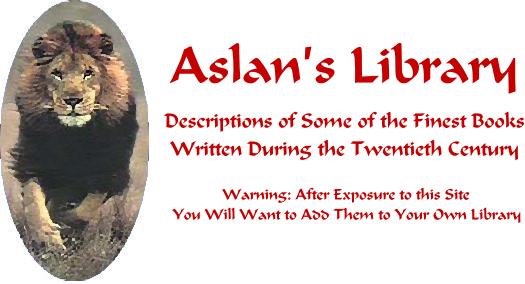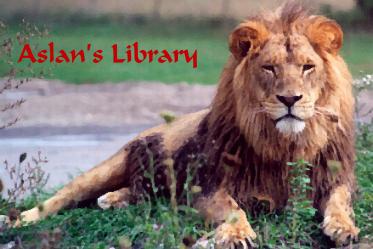Aslan's
Endorsement |
Title
Description of the book's content
 |
Literary Type
Publication Date |
|
Collected Poems of C.S. Lewis
Gathers together Lewis' previously published poetry along with seventeen previously unpublished poems.
 |
Poetry
1994 |
|
All My Road Before Me
Lewis' diary entries over the period 1922-27, edited by Walter Hooper.
 |
Diary
1991 |
|
Christian Reunion
A dozen essays, including "Dangers of National Repentance" and "Two Ways with the Self."
 |
Essays
1990 |
|
Timeless at Heart
Nine essays, including "Why I Am Not a Pacifist" and "The Pains of Animals."
 |
Essays
1987 |
|
Present Concerns
Nineteen essays including "The Necessity of Chivalry" and "The Empty Universe."
 |
Essays
1986 |
|
Letters to Children
A collection of Lewis' correspondence with children, who continue to be inspired by his Chronicles of Narnia.
 |
Correspondence
1985 |
|
Latin Letters of C.S. Lewis
A collection of Lewis' correspondence with Don Giovanni Calabria of Verona and his congregation, 1947-1961.
 |
Correspondence
1985 |
|
Boxen: Imaginary World of C.S. Lewis
The earliest writings of Lewis, dealing with a make-believe world created while growing up in Ireland.
 |
Juvenilia
1985 |
|
First & Second Things
Seventeen essays on theology and ethics including "On the Reading of Old Books" and "Horrid Red Things."
 |
Essays
1985 |
|
The Joyful Christian
One hundred and twenty-seven selections gleaned from a wide variety of Lewis' writings.
 |
Excerpts
1984 |
 |
The Business of Heaven
Daily readings selected from Lewis' writings to encourage and teach throughout the entire year.
 |
Excerpts
1984 |
 |
On Stories
A collection of essays on literature, including "On Science Fiction" and "Tolkien's Lord of the Rings." Published in the U.K. as Of This & Other Worlds.
 |
Essays
1982 |
 |
A Mind Awake
An uplifting anthology of Lewis' writings edited by Clyde Kilby..
 |
Excerpts
1980 |
|
They Stand Together
Lewis' letters written between 1914 and 1963 to his lifelong friend Arthur Greeves.
 |
Correspondence
1979 |
 |
God in the Dock
A treasure trove of forty-eight essays related to various theological and ethical subjects such as "Xmas and Christmas."
 |
Essays
1979 |
|
The Dark Tower & Other Stories
Four stories and two novel fragments. (Lewis' authorship of these works discovered after his death has been challenged.)
 |
Fiction
1977 |
|
Fern-Seed and Elephants
Includes eight essays related to Christianity including "The World's Last Night."
 |
Essays
1975 |
|
Narrative Poems
Includes "Dymer," "Launcelot," "The Nameless Isle" and "The Queen of Drum.".
 |
Poetry
1969 |
|
Selected Literary Essays
Twenty-two literary essays including "The Vision of John Bunyan," "Kipling's World" and Four-Letter Words."
 |
Essays
1969 |
|
A Mind Awake
An anthology of C.S. Lewis edited by Clyde Kilby, founder of the famous Wade Center at Wheaton College..
 |
Excerpts
1968 |
|
Letters to an American Lady
Lewis regarded answering correspondence from fans and inquirers as an important part of his Christian duty..
 |
Correspondence
1967 |
|
Christian Reflections
Fourteen essays including "Christianity and Literature," "Historicism" and "On Church Music.".
 |
Essays
1967 |
|
Of Other Worlds
Essays and several short stories, all of which are also included in Of This and Other Worlds, including "On Three Ways of Writing for Children.".
 |
Essays
1966 |
|
Studies in Medieval & Renaissance Literature
Insightful articles including "Imagination and Thought in the Middle Ages" and "The Genesis of a Medieval Book."
 |
Literary
1966 |
 |
Letters of C.S. Lewis
This collection was edited by Lewis' brother Warnie Lewis, and includes his personal memoir.
 |
Correspondence
1966 |
|
Screwtape Proposes a Toast
Includes eight pieces including, in addition to the title work, "Is Theology Poetry?" and "On Obstinacy in Belief."
 |
Essays
1965 |
|
The Discarded Image
This "Introduction to Medieval and Renaissance Literature" provides a fine exposition of the Medieval worldview.
 |
Literary
1964 |
|
Poems
All of the poems in this volume are included in Collected Poems.
 |
Poetry
1964 |
 |
Letters to Malcolm: Chiefly on Prayer
This fictitious correspondence provides an insightful exploration of prayer.
 |
Inspirational
1964 |
|
They Asked for a Paper
Twelve papers including "The Literary Impact of the Authorized Version" and "The Inner Ring."
 |
Addresses
1962 |
|
An Experiment in Criticism
Lewis' approach to distinguishing between the various varieties of pleasure created by works of art, including literature.
 |
Literary
1961 |
 |
A Grief Observed
Originally published under a pseudonym, this book deals with the intense grief arising from the loss of a loved one.
 |
Autobiographical
1961 |
|
The World's Last Night
Collection of essays including "Good Work and Good Works" and "Religion and Rocketry."
 |
Essays
1960 |
|
Studies in Words
Examinations of concepts such as "nature," "sad," "wit," "conscience" and "sense."
 |
Literary
1960 |
 |
The Four Loves
A classic study of the distinctly different loves, employing the Greek divisions such as eros and agape. This material is also available in an audio version!
 |
Literary
1960 |
|
Reflections on the Psalms
Issues and insights raised during Lewis' use of the Psalms as a devotional tool.
 |
Literary
1958 |
|
Till We Have Faces
The Cupid and Psyche "myth retold," suggesting we must gain a face or soul before we can look into the face of God.
 |
Literary
1956 |
 |
The Chronicles of Narnia
Not originally published as a complete series, this is the preferred method today of obtaining the seven volumes. These precious gems delight children and adults alike.
 |
Children
1950-56 |
|
The Last Battle
Final volume in the Chronicles of Narnia, it marks Narnia's "Armageddon" and the entrance into glory for the faithful..
 |
Children
1956 |
 |
Surprised by Joy
The subtitle, "the shape of my early life," describes the contents, highlighted by Lewis' conversion experience which has inspired countless others.
 |
Autobiographical
1955 |
|
The Magician's Nephew
Sixth volume in the Chronicles, this book describes the spectacular creation of Narnia.
 |
Children
1955 |
|
English Literature in the Sixteenth Century Excluding Drama
Lewis' landmark contribution to The Oxford History of English Literature. Reprinted in 1990 as Poetry & Prose in the Sixteenth Century.
 |
Literary
1954 |
|
The Horse and His Boy
Fifth volume in the Chronicles, this book expands our knowledge of the Narnian world, with a tale set primarily in two neighboring kingdoms.
 |
Children
1954 |
|
The Silver Chair
Fourth volume in the Chronicles, this book details the rescue of the crowned prince of Narnia.
 |
Children
1953 |
|
The Voyage of the 'Dawn Treader'
Third volume in the Chronicles, this book introduces the heroic character Reepicheep, whose name perfectly fits this valiant Mouse.
 |
Children
1952 |
 |
Mere Christianity
Perhaps no single book has more greatly influenced women and men searching for a credible exposition of Christian faith in our century.
 |
Theology
1952 |
|
Prince Caspian
Second volume in the Chronicles, this book explains how the four young heroes of the first volume must deliver Narnia from foreign oppression.
 |
Children
1951 |
|
The Lion, the Witch and the Wardrobe
The beginning of the Chronicles of Narnia, which would thrill countless readers around the globe for decade after decade.
 |
Children
195 |
 |
The Weight of Glory
A meditation on the coming glories of heaven and several additional addresses.
 |
Addresses
1949 |
|
Arthurian Torso
Lewis' commentary on the Arthurian poems penned by his good friend, the gifted writer Charles Williams.
 |
Literary
1948 |
|
Miracles
This study of an integral dimension of spiritual reality is ably discussed by Lewis, whose commitment to reason and revelation are a model for intelligent Christianity.
 |
Theology
1947 |
 |
The Great Divorce
This book answers an ageold question. It provides a creative and insightful answer to why some souls choose hell over heaven, despite the boundless mercy of God.
 |
Fantasy
1946 |
 |
Space Trilogy
The entire three volume series, also known as the Cosmic Trilogy, which is currently available in a boxed set.
 |
Science Fiction
1945 |
|
That Hideous Strength
Conclusion to the Cosmic Trilogy, with our protagonist returned to Earth. Lewis called it "a modern fairy tale for grown-ups."
 |
Science Fiction
1945 |
|
Beyond Personality
Subtitled "the Christian Idea of God," the book derived from a series of talks.
 |
Theology
1944 |
 |
The Abolition of Man
Lewis' critique of higher education, based upon the concept of Moral Law innately known by all people.
 |
Academic
1943 |
|
Perelandra
Second volume in the Cosmic Trilogy which describes a newly created, sin-free world... on the verge of temptation.
 |
Science Fiction
1943 |
|
Broadcast Talks
Inspiring talks delivered over BBC by Lewis during the darkest days of World War Two, during 1941 and 1942.
 |
Addresses
1942 |
|
Christian Behavior
Eight addresses originally delivered by Lewis over BBC with four additional chapters, including "Christian Marriage."
 |
Addresses
1943 |
|
A Preface to 'Paradise Lost'
A series of lectures delivered by Lewis on the important work referenced in the title.
 |
Addresses
1942 |
 |
The Screwtape Letters
Lewis' innovative, and often imitated, approach to fictional correspondence. His letters from a senior devil to a junior tempter provide great insight into the life of faith.
 |
Science Fiction
1942 |
|
The Problem of Pain
In this volume Lewis addresses one of the most pressing and troublesome issues in the Christian understanding of the world.
 |
Theology
1940 |
|
The Personal Heresy
Lewis contributed half of the six essays in this volume which considers how much of the author's personality should enter into their poetry.
 |
Literary
1939 |
|
Rehabilitations
Ten essays, including "A Semantic Nightmare," High and Low Brows" and "Christianity and Literature."
 |
Essays
1939 |
|
Out of the Silent Planet
The first volume in Lewis' Cosmic Trilogy, the protagonist Ransom is taken to Mars where he faces a climactic trial.
 |
Science Fiction
1938 |
 |
The Pilgrim's Regress
In this delightful allegory, in which Lewis explores the roles of Reason and Romaniticism as they relate to the search for faith.
 |
Allegory
1933 |
|
Dymer
A lengthy narrative poem, with mythological overtones, written by Lewis prior to his conversion to Christianity.
 |
Poetry
1926 |
|
Spirits in Bondage
Lewis' first book which included poetry written over a number of years, including the time he served in the World War One trenches of France.
 |
Poetry
1919 |
 |
C.S. Lewis: Companion & Guide
Although not written by Lewis, this book (by Walter Hooper) is an indispensable resource for all students of Lewis. Aslan strongly recommends it!
|
Reference
1996 |





